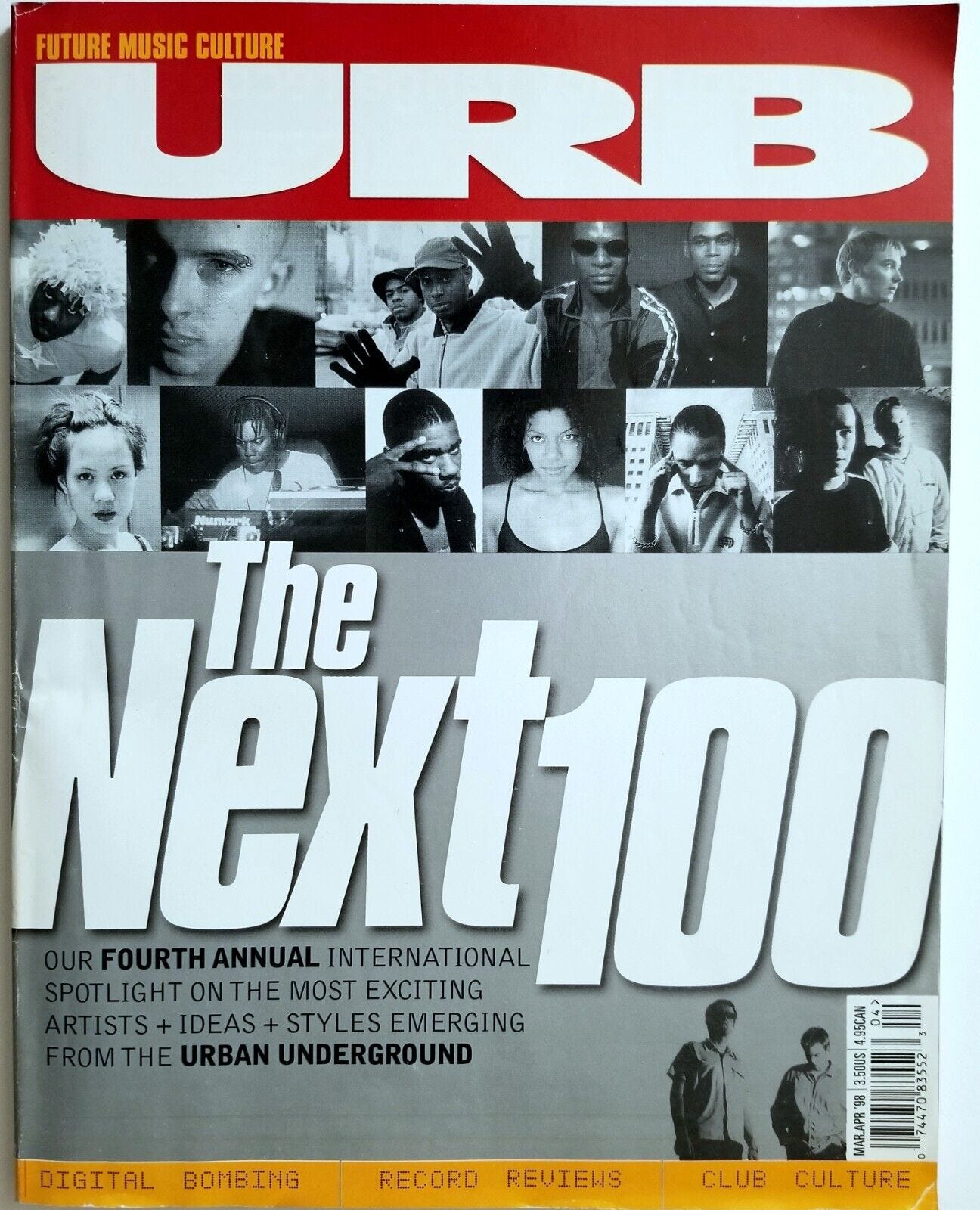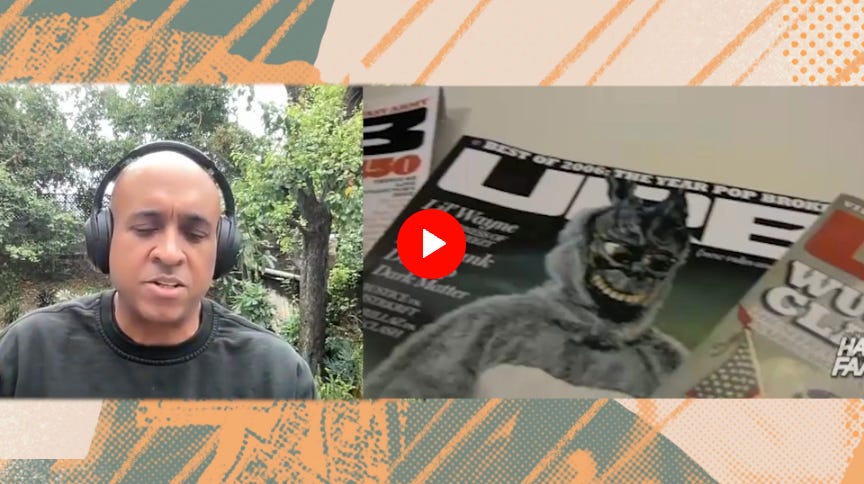
There’s a tendency when media talk about media for the former to fail to acknowledge that when it’s talking about the latter, it’s talking about itself.
We’re gonna try not to do that here, because this week we spoke to Raymond Roker, the founder of URB Magazine, a publication that, in a way, planted the seed for the Cadence way back in 2006 when we (Josh and Chris) first met while working on an URB x Sauza collaboration.
If you’re a newer reader unfamiliar with URB, just know that from 1990 to 2010, it was one of the largest independently published magazines spotlighting emerging music and culture. And if you’re too young to know what that means, then just take a look at the first ten years of Coachella lineups and you’ll get the idea.
Roker recently relaunched URB as a Substack, looking back on the magazine’s archive and impact through the lens of 2023. In the 13 years in between, he was invovled in Red Bull’s inhouse publication, Red Bulletin, helmed content for Coachella (including the yearly live stream and lauded 2020 documentary) and served as Global Head of Editorial for Amazon Music.
Taking a break after a decade in corporate entertainment, Roker’s mission for the new URB is, in a way, the opposite of its original 20-year run. The print magazine was almost exclusively dedicated to covering the now and the next, delivering some of the first national coverage for artists like The Roots, The Chemical Brothers, TV on the Radio, Kanye West, M.I.A., etc.
But in today’s media environment, when the Internet has squeezed new and old music into a flat circle, it seems like the most popular moments are the ones looking back. Hell, even Taylor Swift’s record-crushing mega-tour was called Eras, for gosh sake.
“I'm trying to come up with parallels that both celebrate something that happened 30 years ago and try to imply at least the connection to something that's going on today,” Roker says about URB 2.0 (the numbering is ours, not his).
Those sort of connections are what humans traditionally called wisdom, and it is evident in a recent essay written by Roker called Machine Learning that equivocates URB’s earliest days at the dawn of desktop publishing to the coming wave of AI-assisted creativity.
“I almost felt like punk, but with technology,” Roker recalls of URB’s first years. “So we weren't stapling the zine. We weren't doing it by hand at Kinko's.”
That early adopter attitude paid off. “That was not something that most people did, which is where we had the advantage.”
Of course, everyone now has the same advantage. And while the past decade of online media has created a race to the bottom in order to rise to the top (of the new feed), Roker sees more of an appetite for nuanced and niche cultural coverage than we’ve been led to believe.
“The fire hose of content trying to game the algorithm has obviously proven to have major cracks and has been largely dismantled,” Roker posits as a reason to be hopeful. “The new breed of creator is absolutely aiming for quality versus, say, a half generation ago.”
Many of those creators are using formats that were barely conceivable when URB published its final issue in 2010 (the website crawled along for a few more years).
“I find more voices, not in a traditional sort of magazine construct, but in an Instagram channel,” Roker reveals. “Some of the hip-hop blogs, some of the electronic music ones, they have a good following, and I think people have really discovered that they're meaningful.”
Memeaful might be more apt, although that doesn’t make the charm of accounts like I Still Love H.E.R. and There Is No Planet Earth any less interesting inside your feed.
Ironically, long-form content also seems to be thriving. The New York Times has doubled down on its Popcast content in recent months, indicating that demand is there. The same can be said for retro-looking pods like Bandsplain and 60 Songs That Explain the 90s (now extended to 120 episodes with a book on the way). Even Substack has begun to generate printed material, with Shawn Reynaldo’s First Floor newsletter of essays about dance music getting the ink and paper treatment from Velocity Press.
And while one could accuse the 40-something creators behind media properties of being dusty old heads, there are younger moguls like Derrick Gee whose 750,000 TikTok and IG followers get his takes on Ryuichi Sakamoto and Led Zeppelin, alongside BTS and Olivia Rodrigo, although the olds seem to perform better.
Could it be that as the steady stream of new music that was URB’s specialty has now becoming an unmanageable deluge, listeners are trading in the obsession with what’s “next” for a folklore tradition where the same age-old tales are enjoyed from generation to generation? Could Kurt Cobain be our Robin Hood? The singer from Smashmouth our Paul Bunyon?
Or maybe it’s just sentimentality. Not that it’s a bad thing.
“I kind of see it as just a personal mission — anything that is in my sphere of control — to take really great care of it and ensure that it's preserved and can be accessed in the future because that's someone's story,” says Roker. “That's someone's time on this planet doing some really great work.”
If you want to learn more about the URB Archive, along with Raymond Roker’s experiences creating content for Coachella and Amazon, you can watch our full conversation by becoming a paid subscriber.
TAKEAWAYS
Salient statements from this week’s music news [regulators edition].
1. The RIAA Wants AI Voice Cloning Sites Added to the Government’s Piracy Watchlist
Apps like Voicify.AI would be added to the annual list of illegal torrenting, stream ripping, cyber locker sites.
Takeaway: An additional challenge in regulating this area is that many AI models available on the internet for global users are not based in the U.S., meaning the U.S. government has little recourse to stop their alleged piracy, even if alerted by trade organizations like the RIAA.

2. Spotify is Hiring for Government Affairs Experts in Multiple Markets Amid Ongoing Battle With Apple
A win for Spotify would mean more opportunity for revenue from platform purchases without the 30% app tax.
Takeaway: The position could mean going up against Apple and Google in the halls of political power. Spotify CEO Daniel Ek has been crisscrossing the globe in an effort to convince governments to weaken the power held by the Apple and Google Play stores.

3. FTC Formally Proposes Ban on ‘Junk Fees’ — Including ‘Hidden Mandatory Fees’ for Concert Tickets
With record-breaking ticket sales, hidden fees on concert tickets seem to be a problem in name only.
Takeaway: Live Nation previously indicated that it was unworried about an all-in mandate. “We don’t believe there will be any impact whatsoever if there was a nationwide mandate for all-in pricing,” president and CFO Joe Berchtold spelled out in November of 2022.







Amazing first paragraph. The media forgets it's talking about itself!
Anyway I'm a music writer myself. Let's subscribe to each other's newsletters.